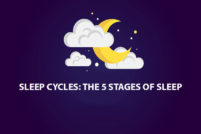The practice of intermittent fasting has been in the limelight recently due to the keto diet trend and has been touted across social media as an easy way to burn fat, lose weight and boost energy.
But fasting isn’t that new or revolutionary. In fact, it has been practised around the world by ascetics and religious lay people for centuries, particularly, by Muslims during Ramadan, who fast during daytime hours for one month a year.
Apart from its fat burning or spiritual benefits, though, there is some evidence to suggest that fasting can affect sleep and can even reset one’s circadian clock by reversing one’s natural waking hours. While there is much to be learned in this area and scientists don’t fully understand how sleep and fasting are connected, there has been some interesting research in this area. Keep reading to learn more about some of these findings.
Fasting, sleep and the body’s internal clocks
You’ve probably heard of circadian rhythm, the internal clock in our body that tells us when to sleep and when to get up. But science tells us that the body actually has two clocks, your central clock, which is located in the brain and responds to external signals, like daylight and temperature, and your peripheral clock, found in every cell outside the brain and affected by feeding and fasting.
These two clocks work in synchronicity with one another and any long-term disruption between the two can affect your health and/or energy level.
Further to these findings, the same research showed that eating at “proper” daylight times can help prevent disease and prior studies have shown that women who work shift work and have an erratic sleep/eat schedule have a higher risk of cancer.
Dr. Ueli Schibler at the University of Geneva summarizes these findings by explaining that it, “seems pretty clear that the long-term disruption of circadian rhythms is pretty harmful.”
Fasting and improved sleep
It’s not all doom and gloom, though. Unlike nurses and other graveyard jobs that involve long-term sleep disruption or deprivation, which can be unhealthy, other studies have shown that short-term fasting (one week) in healthy individuals can actually improve sleep quality. It does this primarily by lowering the instances of sleep disruption caused by things like periodic leg movements. It can even improve “daytime concentration, vigour and emotional balance.”
The research goes on to explain that this peak in daytime performance may have been evolutionary, or borne out of necessity, from times when we needed that extra boost to search for food. It is important to note, however, that this isn’t necessarily enough cause to introduce one week fasts into your schedule, as it was a small study of only 15 subjects and more research is needed.
How to hack your sleep schedule by fasting
So, how can you use fasting to reset your sleep schedule? Resetting your body’s internal clock to reverse daytime and nighttime is particularly useful for these shift workers we just mentioned and it seems as though we can trick this second peripheral clock into thinking night is day by simply fasting during the 12-16 hour period before you want to be awake.
Research out of Harvard Medical School, led by Dr. Clifford Saper, discovered that by simply not eating for this length of time before sleep could trick the body into being more alert during waking hours, likely because, biologically, your brain understands that this time is needed to find food and so you must be awake and ready for foraging.
How does Ramadan affect sleep?
Again, there is not a lot of research done on this topic, despite the more than one billion potential subjects. Most research on fasting is done on subjects who fast day and night, not only during the day. However, one study has shown that fasting during Ramadan does seem to affect melatonin levels, even if it isn’t significant. In the study, eight healthy individuals partaking in Ramadan fasting reported to the Sleep Disorders Center on four separate occasions.
The results were that melatonin levels kept the same circadian pattern throughout Ramadan but the level of the hormone dropped significantly from baseline. There was also a significant reduction in sleep latency (subjects fell asleep faster) and REM sleep during the third week of fasting, but otherwise, no major changes were observed.
Other research suggests Ramadan fasters that can sleep in the day have an easier time at managing the fast, likely because they are not expending as much energy and the daylight isn’t there to send those “eat” signals to the brain. Still, others observe daylight hours as normal and go to sleep shortly after eating, which poses its own problems.
While most subjects lose weight during Ramadan and gain it back after Ramadan ends, a study in Saudi Arabia reported a significant increase in subject’s weight, likely due to eating late at night, causing a rise in cortisol. As we already know, eating before bed can cause other health problems, like acid reflux and excessive energy, making it difficult to sleep.
When Ramadan falls in the calendar year is also a factor here, as it is controlled by the lunar calendar and can fall in summer months with long days and late sunset, or in the winter, with shorter days and less daylight.
How to use fasting to benefit your health
Fasting isn’t necessarily for everyone and should only be attempted by healthy individuals with no issues with blood sugar. There is no prescribed “right way” to attempt a fast and there are tonnes of fitness experts that recommend a variety of time intervals, lengths and ways to fast. The best type of fast will depend on you and your needs and how it accommodates your lifestyle.
Some experts recommend setting an “eating window” of eight to 10 hours in the day and fast the rest of the time. Others suggest restricting calories for two whole days a week or fasting from one dinner to the next.
The most important thing is to listen to your body and pay attention to any loss of energy or focus and especially to dizziness or faintness. When you do eat, make sure it is healthy and make sure you getting optimal sleep hours, so your body can rest and recover and you aren’t expending unnecessary energy.





